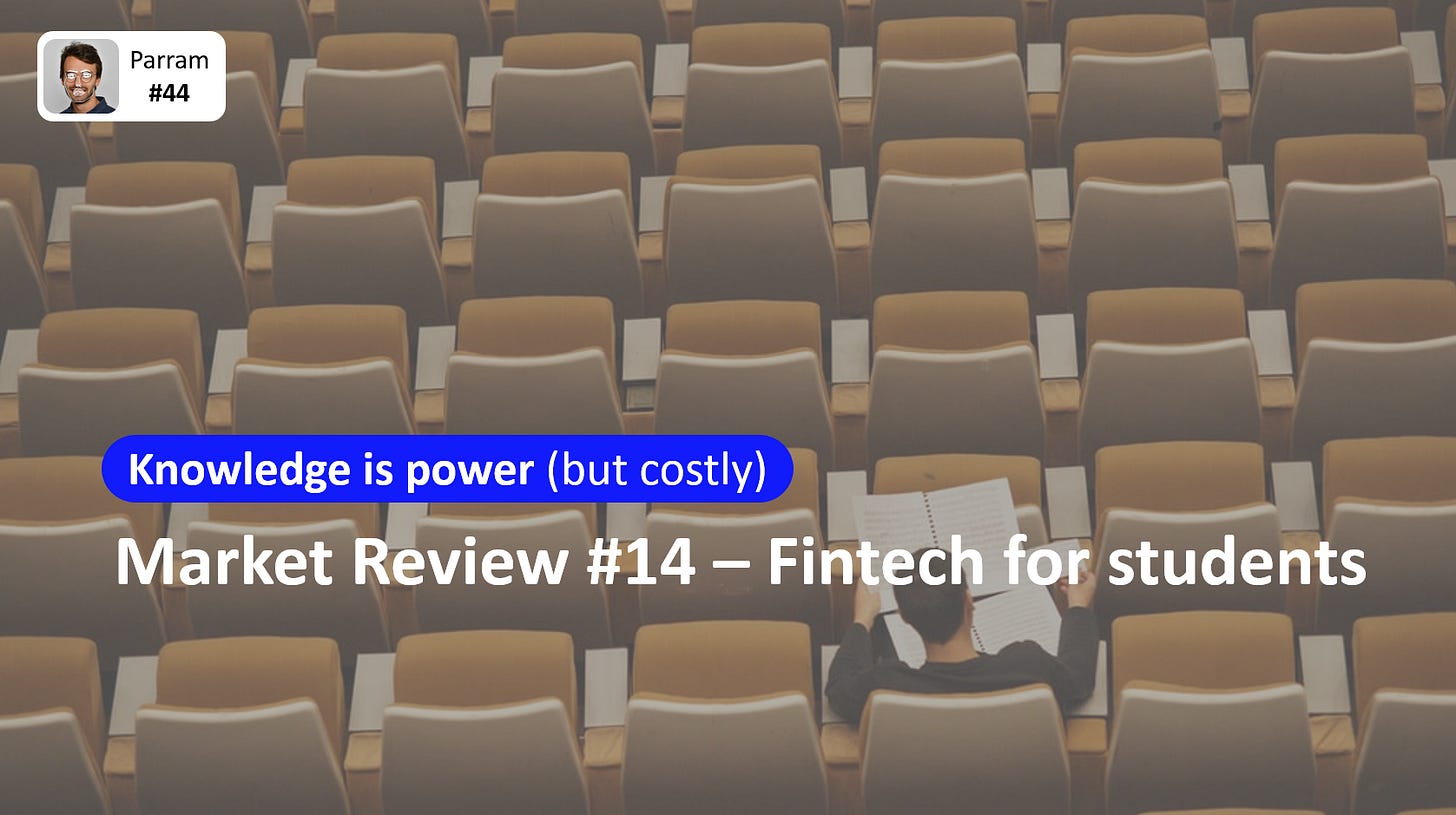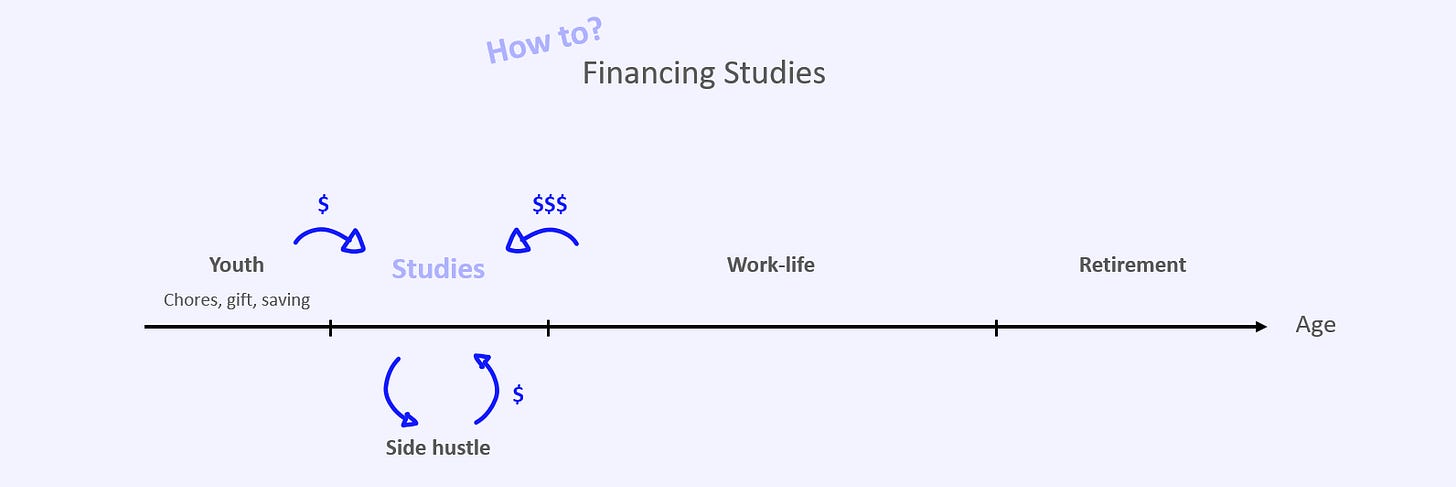This is a great weekly newsletter about Fintech & Insurtech. To receive this newsletter in your inbox each week, you can subscribe here:
Hi, this is Clément from HUB612👋
Welcome to all the new followers and hello to everyone!
As I graduated 2 years ago, I’ve experienced myself the financial barrier to education. Entering well known business schools is extremely costly, and it’s getting worst.
In today issue, I’m casting some lights on what’s happening in the market and how fintech are trying to dress the financial wound of expensive education.
Education challenged and re-invented
Studying costs a LOT more
In the 20th century, for those who could afford it, continuing their studies after high school was possible by joining University or “Grande Ecoles”. If you wished to follow the exact same path today, it would cost you an arm and a leg.
Not only because of the tuition fees that skyrocketed over the last 20 years (they increased x8 faster than the inflation-adjusted growth rate of real wages) but also due to the rise in the price of housing, the food, ..
Paradoxically, we are now in an open connected world where knowledge is widely accessible online for free.
People should invest in skills rather than school names
That’s it, that the lifehack. How many friends and acquaintances are graduating from top business and engineering schools and (i) feel they learn nothing worthy (ii) are a mismatch with all hiring companies expectations (iii) ..
To respond to that, new types of schools are appearing. They are building bridges of knowledge between you and the market expectation: Le Wagon (Bootcamp), Ecole 42 (School), Minerva (School), Oclock (Bootcamp), Holberton (School), ..
Life-long students
Let me tell you a fairytale. What you learn up to your first job start, is enough for the rest of your career.
My belief is we’ll have multiple professional life. We’ll tend to reinvent ourselves multiples times. That being said, you are going to see a flated curve in the coming decades. More and more employees will churn, eventually, go back to school and get a completely different job life.
Go check what Rocket School is doing for business developer/customer success manager/digital marketing manager.
Fintech help Edtech
Even though there are some alternatives to traditional education paths, most students still go to University/Grande Ecoles. And that’s fine! But how can fintech help them access their dreamed school?
An account that grows with the kid
A growing trend is vault. I very much like the idea, as long as you (i) don’t open them too soon (ii) you put to work your money.
Call it a piggy bank, savings, vault, .. The idea is putting money aside every month for your kiddo. The compound effect of it will, after 18 years, substantially augment the amount saved.
The complexity here is that the parents must be aware of that. They need financial education and an understanding of long-term investment. Only then, you can help kids. Not an easy task, the market is still small but global efforts made by all fintech players to educate the consumer + the increased accessibility to financial services will grow this opportunity.
Potential Student extra Income
Something particular about work that appeared recently and that is characterizing my generation is the side-hustle. See it as a secondary business or project that brings in, or has the potential to bring in extra income.
More common among those aged 25 to 34 aka generation side hustle, it has gained popularity with the rise of digital platforms, no-code tools, and social networks, offering new opportunities to connect, create and make money.
You can make money out of xx (= basically everything), we just don’t know it. We all have something valuable (skill, intellect, .. ) that we can sell. These digital platforms and tools lower the barriers to enter the market. Just step forward!
Income Share Agreement (ISAs)
ISAs are a growing alternative to traditional student loans to finance higher education tuition fees. Rather than focusing on student history, financial players bet on its future potential, a total change in terms of perspective.
Instead of paying fixed interest loans, ISAs model relies on taking a percentage of the future income taken on the salary for a certain period when (i) students start working and (ii) are paid above a certain threshold.
For the US only, the total ISAs originated have scaled from $0 in 2015 to nearly $300m in 2020 in the US. And that’s due to a growing number of startups building businesses around ISAs!
Tuition tokens
Still a very new use case: even though crypto is becoming mainstream. Tuition token is an alternative payment method for higher education-related costs (housing, meal plans, books, transportation, .. ) and can be used to pay off student debts or to invest in the cryptocurrency market.
Reaching financial stability
Dropped into the world, how easy is it to reach financial stability in a self-thought manner? Good luck resolving your financial equation on your own!
Plenty of startups (and communities) are now helping you, directly or indirectly, to do it. Either it is through financial coaching, community-led product, .. Which clearly involves sharing best practices and common sense, as well as errors not to make.
Or, helping schools and corporations in adding off-the-shelf technological bricks to their offer. Such as debt repayment plans (Rightfoot), help students and school applicants find the right funding (Unly), ..
Guarantor intermediary
A student loan is the biggest financial decision in a young person's life. As you may know, it’s a long process full of paperwork and obviously stressful.
When you decide to get a loan, you’re not 100% sure you’ll get it. Indeed, banks require students to have someone that will act as a guarantor.
New players are breaking this financial barrier and allow more students to get access to education.
To improve my work, please tell me how you felt about this issue!
Previous issues (wait, there’s more!)
🙏 2021 Fintech wishlist
💵 Cash Management for SMEs | Investment Memorandum #2 Agicap
✈️ Sorry, that’s excluded | Market Review #8 Travel Insurance
🖼️ Culture is the new asset | Investment Memorandum #6 MasterWorks
See you next week 👋
📧 I’m clement.parramon@hub612.com and @cparraam is my Twitter
Ps. If you like what I’m doing with Parram please feel free to share it on your social network of choice. Also, I’d appreciate it if you forwarded this newsletter to a friend you think might enjoy it ✌️











